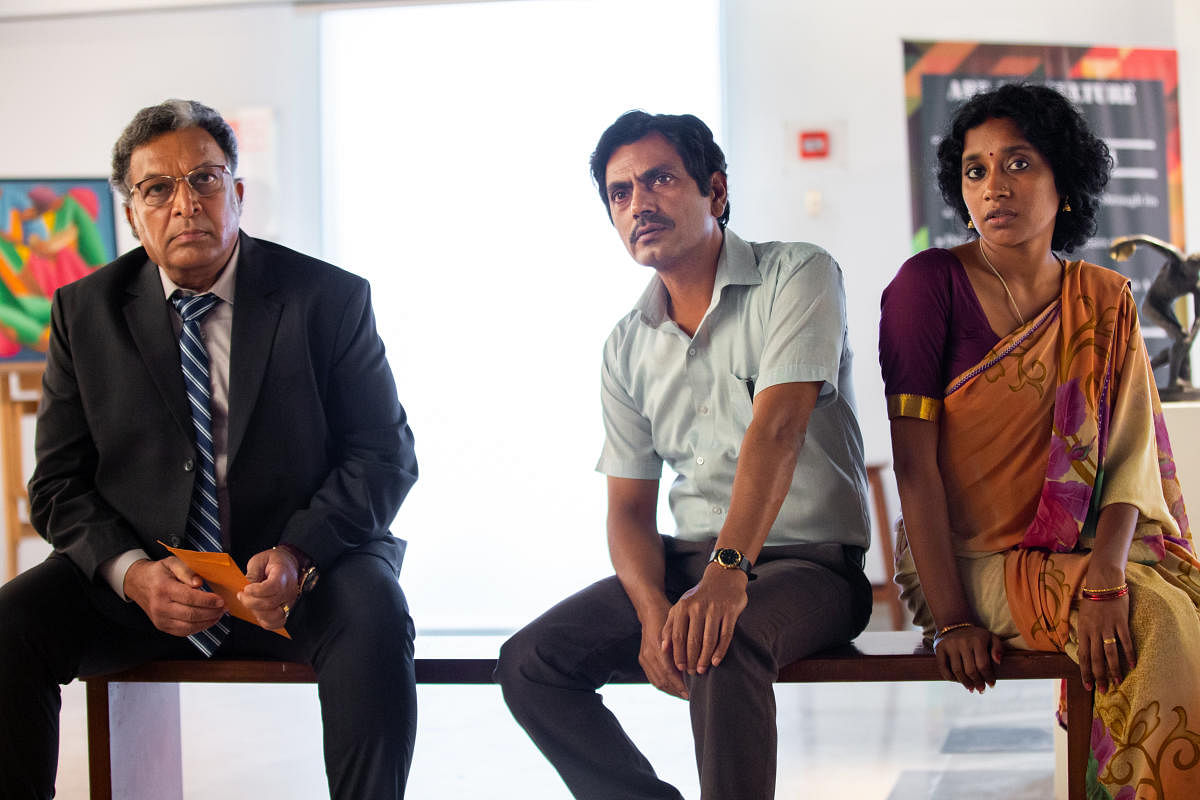I can't deal with primitive minds, thunders Ayyan Mani (Nawazuddin) from the dingy confines of his Mumbai chawl. The Tamil Dalit has managed to crawl up the social ladder a bit, but is still a doormat for his Brahmin astrophysicist boss (Nassar).
So Mani begins conspiring against the world, demanding his pound of status. The pawn in the plot is his son Adi, a whiz-kid who is equally at ease with maths and microbes. Soon the spotlights are on, and the media is at the doorstep to interview the genius in gutter.
Based on a novel by Manu Joseph, 'Serious Men' is a satire that holds true in the current sociopolitical environment. From politicians to scientists to street urchins, almost everyone can pull off a fraud and con the nation. So we have mega studies to dissect dotted condoms and balloon missions to probe 'microbes ki mahamari' on the stratosphere.
While it takes just a few phone calls for the privileged to get what they want, it takes at least four generations for the oppressed to clear the smallest of hurdles. But nobody flashes the victim card here. Everyone pays back in the same coin. And that's the beauty of Sudhir Mishra's latest, with no frills.
Nawazuddin Siddiqui, as usual, is a delight as the common man who resents and aspires. He transforms into Ayyan Mani, a critique of the broken system and its lopsided structure, who eventually joins the circus to survive.
'Serious Men' (with its share of the not-so-serious) also takes a dig at our education system that rewards students who mug up and spit out. Mani also subscribes to this rote at some point in time.
Never mind, he just wants to update his life from '2G' to '4G' (fourth-generation elite).
Children must be encouraged to develop an inquiring mind: Sudhir Mishra
How must education prepare a child for life?
In India, children are taught to learn from textbooks. No child is encouraged to ask questions about theories or formulae. Real education is in understanding, applying and coming up with your own reasoning, rather than mugging up what is in the textbook. Children must be encouraged to develop an inquiring mind. This is the flaw in the education system which Ayyan Mani exploits to his advantage. Acharya pretends that knowledge is the preserve of only a few. He keeps his knowledge to himself and does not share it with anybody.
How do you juxtapose the characters?
It is the actors who bring a certain complexity into the characters. While Ayyan has a dark side to him, Acharya is this gruff and arrogant man who believes he is always in the right and those around him are fools. In the end, he becomes the opposite of what he was. Both characters explore all aspects rather than stay one-dimensional.
Was choosing the actors for the film a challenge?
A good script always casts itself. It’s like the script takes a life of its own and walks towards the actors. Even Manu Joseph said that he thought of Nawazuddin Siddiqui when he conceptualized the character of Ayyan. For some of the characters you scout for actors, for some others, you simply write the characters and start imagining them.
My character was not the regular kind: Nassar
What was it like to play an arrogant scientist?
It was very interesting because it was not a regular one-dimensional role. The scientist Acharya does all he can to retain his power because he feels people blindly believe his statements. But it is interesting to see how he finally sheds that arrogance, like how a snake sloughs off its skin. He understands the reality and the vagaries that come with it. And how a child becomes the main reason for such a change.
How do Ayyan and Acharya complement each other?
Ayyan happens to be the private secretary of the scientist. When angry, the scientist he vents his frustration on Ayyan. He has no choice but to bear with me because my character is the motivation for Ayyan to make his son like me. But finally, Ayyan makes Acharya realize that arrogance is not the way forward.
Ayyan portrays the emotions of a middle-class Indian: Nawazuddin
What was it like to play Ayyan Mani?
I have always wanted to work with Sudhir Mishra and I was thrilled when I got a chance to do so. Every parent has a dream and they try to fulfil that dream through their
children. Here, Ayyan Mani forces his son to do what he couldn’t achieve. This trend is more visible in parents who are educated and well-informed. For instance, my parents never forced me to follow a certain path, because they never went to school and were illiterate. They believed in my abilities, but not many children today are allowed to follow their heart. I thoroughly enjoyed the role and the challenges that came with it.
How has the middle-class in India changed over the years?
Ayyan portrays the emotions of a middle-class Indian who literally thrusts his views on his child. I think we need to give our children the space to think and chalk out their own path. Sometimes, even actors force their children into acting, even if they don’t want to.
